—By Donna Murray
In an era where innovation and sustainability are no longer just buzzwords but have become the bedrock of forward-thinking businesses, the event industry is undergoing a game-changing revolution. Modular design, the superpower of modern architecture and design, enters the heart of event planning and execution. Let’s dive into the world where creativity, sustainability, and versatility all work in harmony, creating events that are not just visually appealing but also efficient, flexible, and eco-friendly.
As North America’s market leader in event rentals, Quest Events is at the forefront of this evolution, driving change by harnessing the potential of modular design solutions. We provide a broad range of services from pipe and drape, scenic, décor, and furnishing solutions, catering to diverse industries like AV, hospitality, corporate, wedding, and exhibition. The transformational power of modular design is what we swear by, redefining what it means to create truly remarkable event spaces.
Why Modular Design Solutions Are Crucial In Modern Event Spaces
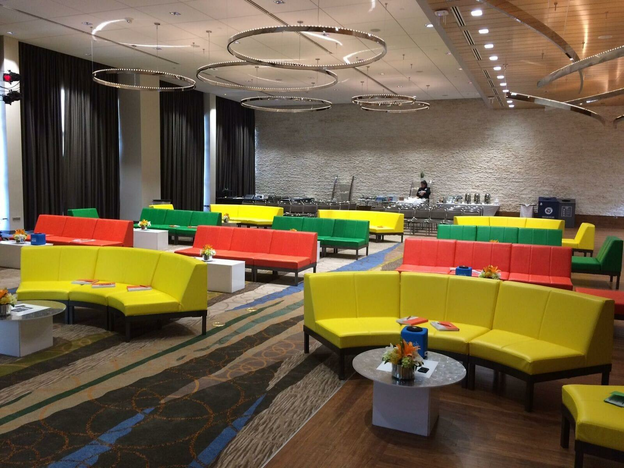
In the ever-evolving world of events, client expectations are continually scaling up, fueled by the desire for unique experiences, optimal space utilization, and more significant sustainability footprints. So, why are modular design solutions becoming the go-to strategy for modern event spaces?
Modular design is a system that divides a system into smaller parts or modules, which can be independently created and used in different systems. It allows for easier, faster construction and rearrangement, and reuse of these modules, presenting an endless array of opportunities for event space designs.
But there’s more to it. The magic of modular design lies in its versatility, sustainability, cost-effectiveness, and ability to offer a personalized, dynamic user experience, perfectly aligning with the ever-increasing and changing demands of the modern events industry.
Understanding Modular Design
Definition Of Modular Design
Modular design, or modularity in design, is a design principle subdividing a system into smaller modules. These modules, or ‘blocks,’ can be independently created, modified, replaced, or exchanged between different systems. This approach allows designers to manage complex designs and facilitates flexibility, customization, and innovation.
In event spaces, the modular design translates into various components – like walls, floors, furniture, stages, backdrops, and more – that can be combined, rearranged, or repurposed in multiple ways. This enables event planners and venue owners to create unique, tailored spaces for every event, from corporate meetings to weddings, exhibitions, or concerts.
Key Features Of Modular Designs
Modular designs stand out for their unique features, each contributing to their versatility, effectiveness, and allure.
- Interchangeability: The modules used in modular designs are interchangeable, enabling you to reconfigure the space according to the specific needs of each event. This level of adaptability is a game-changer in the events industry, allowing for a truly customized experience.
- Scalability: Whether you’re dealing with a small corporate meeting or a large-scale conference, modular design can effortlessly scale up or down to match the scope and requirements of your event.
- Customizability: With modular designs, you’re not confined to fixed layouts or themes. Instead, you can mix and match different modules to create an event space that perfectly aligns with your brand, theme, or vision.
- Efficiency: Modular designs lend themselves to pre-fabrication. This means the various components can be produced off-site and then quickly assembled on-site, resulting in reduced setup times and cost savings.
Modular design in event spaces combines these key features, paving the way for genuinely dynamic, customizable, and efficient events. The revolution is here, and it’s modular.
The Revolution Brought By Modular Design In Event Spaces
The influence of modular design in event spaces goes beyond just aesthetics. Its adoption represents a paradigm shift in thinking about and executing events, encouraging flexibility, optimization, and sustainability. Let’s dive deeper into these three pillars of the modular revolution.
Flexibility Delivered By Modular Design
Modular design is, by nature, flexible and versatile. The design components, like modular walls, stages, or furniture, can be easily moved, rearranged, or modified to fit each event’s specific needs and objectives. This inherent flexibility of modular design allows event planners to customize their space, creating a unique, engaging, and memorable environment for every occasion.
The ability to alter or adapt your event space to accommodate different layouts or themes is particularly beneficial in a dynamic industry like events, where each event has unique requirements. With modular design, you can seamlessly transition from a formal corporate event set up during the day to an intimate, casual social gathering at night, all within the same space.
Space Optimization With Modular Design
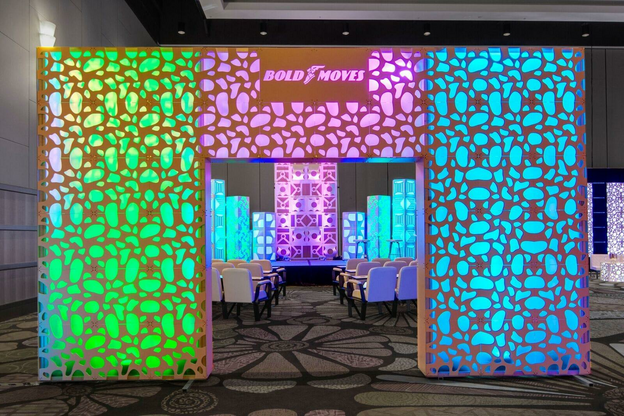
Another key advantage of modular design is its capacity for space optimization. Traditional event spaces often need more effective space usage- unused or overcrowded areas. However, modular design tackles this problem head-on by providing solutions for optimal space utilization.
With modular design, every inch of your event space can be used effectively, as the modules can be customized to fit the exact dimensions of the venue. This also provides the freedom to create different zones or areas within the event space, enhancing the functionality and flow of the event.
Reinforcing Sustainability With Modular Design
The events industry is no exception as global consciousness toward sustainability continues to grow. Modular design, emphasizing reusable components and minimized waste, is inherently eco-friendly.
Each module can be used, dismantled, and reused in a different configuration or for another event, reducing the need for new materials and limiting waste. Additionally, the modular components’ pre-fabrication process allows for manufacturing precision, leading to less waste during production.
Furthermore, the lightweight nature of these modular components means less energy is required for transport, thus contributing to reduced carbon emissions. In a world increasingly focused on sustainability, modular design presents a step in the right direction.
Benefits Of Modular Design In Event Spaces
The integration of modular design in event spaces has significant, wide-ranging benefits. From delivering user-friendly solutions to offering cost and time efficiencies, the merits of this design approach cannot be overstated.
User-Friendly Design Solutions
Modular design is inherently user-friendly. The components are designed for easy assembly and disassembly, allowing for quick setup and teardown of the event space. This reduces the need for specialized labor or equipment, making the process more manageable and less time-consuming for the event team.
Moreover, the flexibility of the modular design means that changes or modifications can be made even at the last minute, providing a level of convenience and control that traditional event spaces can’t match. Whether you need to add an extra exhibit space or adjust the layout to accommodate more guests, modular design makes it possible without causing significant disruptions or delays.
Reduced Costs And Time
Incorporating modular design in event spaces also saves considerable cost and time. Traditional event setup involves substantial manpower, time, and resources. Conversely, modular components are manufactured off-site and assembled on location, drastically reducing installation time.
Moreover, the longevity and reusability of modular components represent significant cost savings over the long term. The ability to reuse and repurpose these components for different events reduces the need for new materials and decreases waste, leading to lower operational costs.
Versatility And Usability
One of the most appealing aspects of modular design is its inherent versatility. The ability to mix and match different modules opens up a world of possibilities for event planners, enabling them to create unique, innovative, and dynamic spaces that cater to various themes, brands, and audience preferences.
Also, modular designs aren’t restricted to just interiors. They also extend to outdoor settings, creating unique, engaging spaces that can accommodate a range of activities, from intimate networking zones to grand stages for performances. This level of versatility enhances the usability of the event space, allowing it to serve multiple functions and cater to diverse needs.
Transforming Event Planning Through Modular Design
As event planners seek to create unique, memorable experiences for attendees, the role of modular design becomes even more significant. Its impact is felt not just in the physical layout of the event space but also in the overall planning and execution of the event.
How Modular Design Boosts Creativity In Event Planning
The introduction of modular design in event planning is a creative game-changer. The endless configurations and combinations possible with modular components allow event planners to bring their most innovative ideas to life.
Modular design provides the flexibility and versatility to think outside the box and innovate, whether creating an unconventional stage design, setting up immersive product display areas, or crafting intimate breakout zones. This creative freedom results in more engaging, unique, and memorable events, delighting attendees and setting a higher benchmark for future events.
User Experience Enhancement With Modular Design
The flexibility and customizability of modular design extend beyond the physical structure and influence the overall user experience at events. With the ability to create tailor-made spaces, event planners can create more engaging, interactive, and personal experiences for attendees.
For instance, modular elements like movable walls or adjustable seating arrangements can help create different zones within the event space, each catering to various activities or moods. This could range from a quiet, comfortable networking area to an energetic, vibrant performance zone. Such an arrangement allows attendees to move freely and choose their preferred experiences, leading to a more satisfying and fulfilling event experience.
In conclusion, modular design has the potential to transform every aspect of event planning, from the conceptualization to the execution phase. Its influence goes beyond aesthetics, impacting functionality, user experience, sustainability, and overall event success. The future of event planning lies in embracing the versatility, adaptability, and sustainability offered by modular design.
Future Of Event Spaces: A Modular Perspective
As we delve into the future, it is undeniable that modular design will play a more prominent role in shaping the landscape of event spaces. With a growing emphasis on sustainable practices, efficient use of resources, and personalization, the trend toward modular event spaces is only set to intensify.
The Growing Trend Of Modular Event Spaces
With its unrivaled flexibility, cost-effectiveness, and environmental credentials, modular design has moved from a niche concept to a mainstream solution within the events industry. More and more event planners are recognizing the benefits of modular design and integrating it into their strategies.
Technological advancements, particularly virtual and augmented reality, further fueled the trend. With the potential to visualize different module configurations and effects in a virtual space before implementation, event planners can experiment with various designs and ideas, reducing the margin for error and enhancing the overall outcome.
In addition, as we continue to navigate the era of COVID-19 and beyond, the importance of adaptable and flexible event spaces has been underscored. The ability of modular design to facilitate social distancing, if required, or adjust to new public health guidelines at short notice, is a significant advantage.
Predictions And Expectations For Modular Event Spaces
The adoption of modular design in event spaces is expected to grow exponentially. As the world becomes more conscious of sustainable practices, the reuse and repurposing of modular components will become more common, significantly reducing the industry’s environmental impact.
Furthermore, as attendee expectations evolve, so will the need for more personalized, immersive event experiences. The modularity, flexibility, and customizability offered by modular design will be integral to meeting these expectations, enabling event planners to design and deliver truly unique experiences.
In terms of design trends, expect more innovative uses of modular components. This could range from dynamic stage designs and immersive display areas to adaptable seating solutions and transformable outdoor spaces. The possibilities will only expand as technology advances and more innovative modular solutions become available.
Conclusion
The modular design represents the future of event spaces. It offers unparalleled flexibility, cost-effectiveness, sustainability, and user experience, making it a vital tool for modern event planners. Modular design is reshaping the events industry with its potential to revolutionize how we design, plan, and execute events.
As North America’s market leader in event rentals, Quest Events continues to embrace and advocate for modular design solutions. We’re committed to providing our clients with the most creative, effective, and efficient rental solutions and installation services, enabling them to host unforgettable events that delight attendees and exceed expectations.
The modular revolution in event spaces is not just a trend; it’s an evolution set to redefine the future of the events industry. If planning an event, consider joining the modular revolution and experience the difference firsthand.
FAQs
How Can Modular Design Solutions Improve The Functionality And Aesthetics Of My Event Space?
Modular Design Solutions can enhance the functionality of your event space by providing flexible and adaptable layouts, allowing you to tailor the space to specific event needs. They also boost aesthetics with clean, modern designs that can be customized to suit your brand’s identity or the event’s theme, enhancing the overall attendee experience.
How Can Revolutionary Design Solutions Offer Greater Flexibility In Event Space Use?
Revolutionary design solutions, like modular designs, offer greater flexibility in event spaces by allowing for easy and quick space reconfiguration to meet various needs. These innovative designs provide customizable layouts, ensuring optimal utilization for any event, whether large or small, formal or casual.
How Does The Cost And Time Of Implementing Modular Design Solutions In My Event Space Compare To Traditional Methods?
Modular design solutions often reduce the cost and time associated with setting up event spaces compared to traditional methods. The process is more efficient as modular components can be pre-fabricated and assembled quickly on-site, eliminating the need for extensive construction work.
Can Modular Design Solutions Provide Sustainable And Eco-Friendly Alternatives For Event Space Design?
Yes, Modular Design Solutions can provide sustainable and eco-friendly alternatives for event space design. They often incorporate reusable materials, promoting less waste compared to traditional methods. Their design flexibility also entails efficient energy use, contributing to lower carbon emissions.






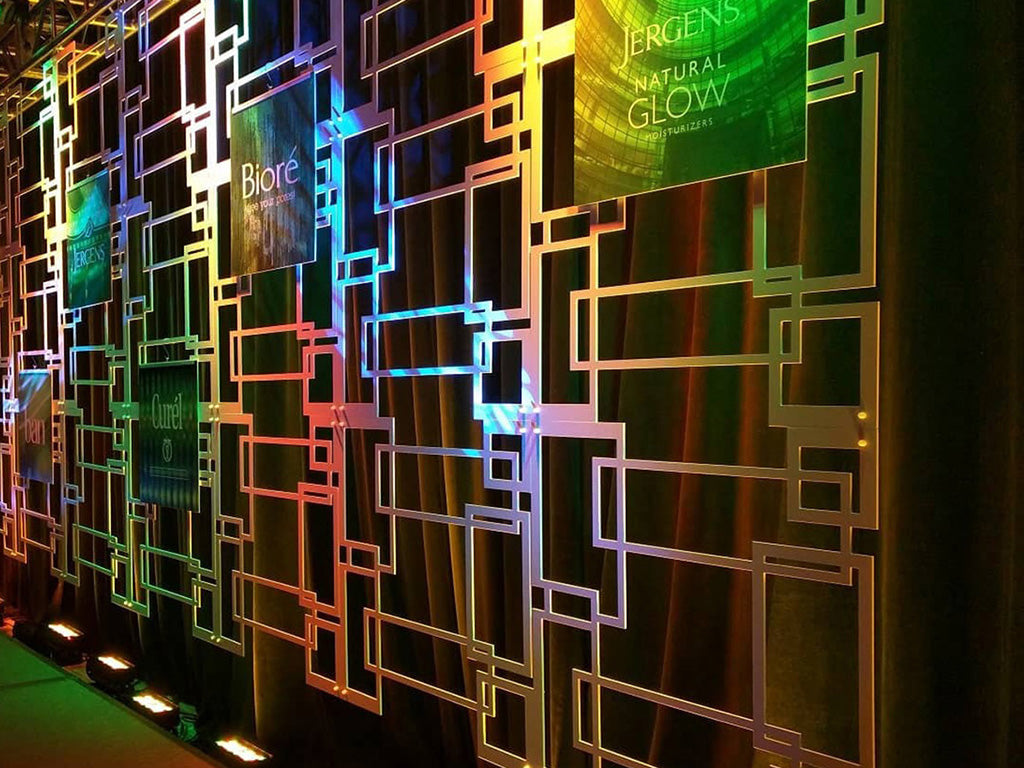
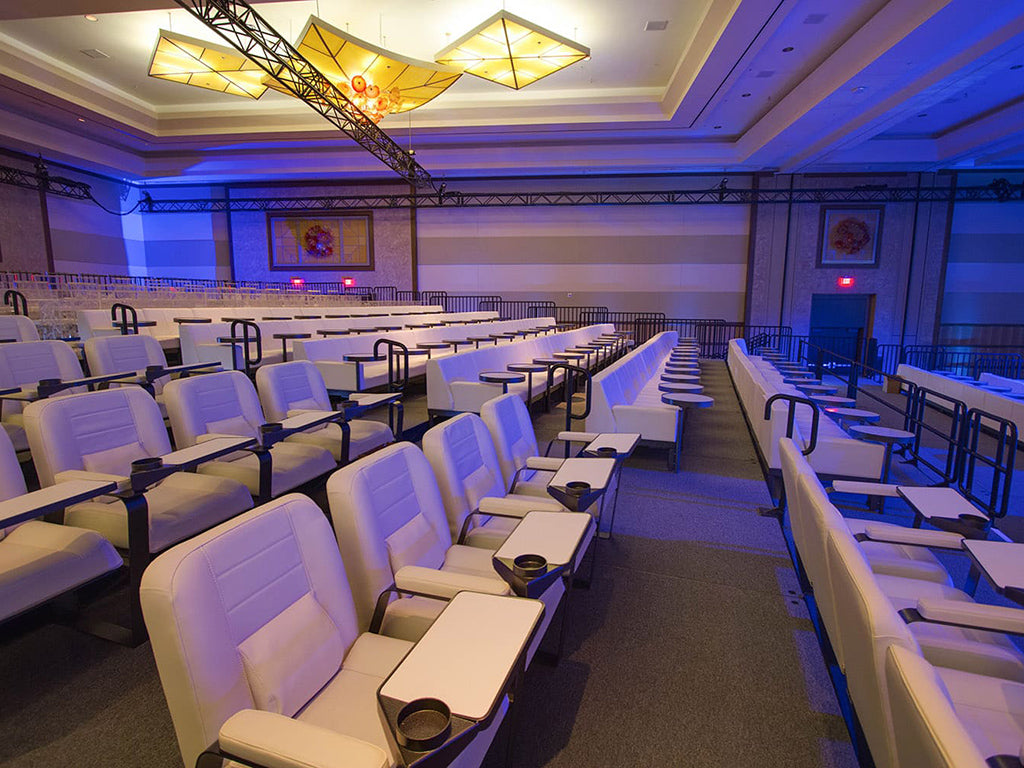

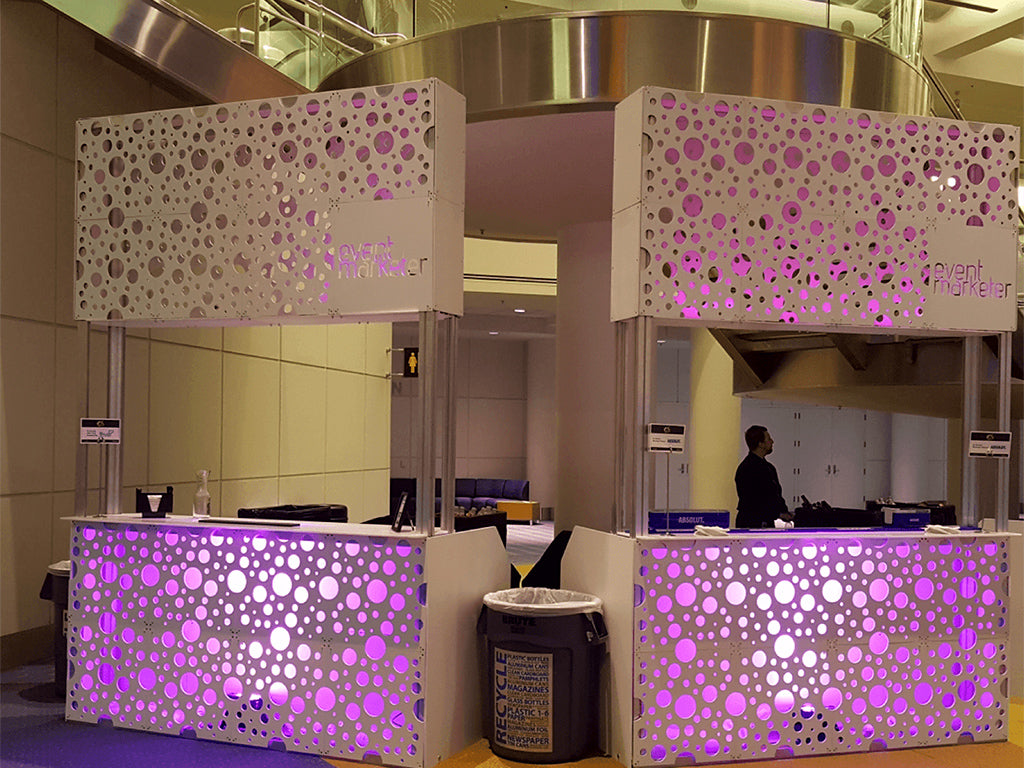
;)